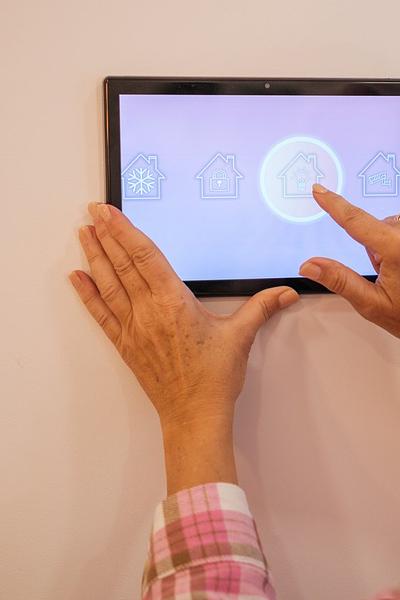
Originally featured on (this will open in a new window)TeckUK
Author: (this will open in a new window)Joseph Chambers, Consultant

The services that are most essential to our everyday lives - water, gas and energy - are moving into the 21st century. They’re increasingly embedded with an array of digital tools and smart technologies, aimed at making our lives easier.
Whether logging into an app to check water consumption or using a smart electricity meter to top up credit, it seems that people need an ever-expanding list of digital skills and equipment just to manage their basic utilities.
The widely held assumption that most people have basic digital expertise and access to technology shapes how our services and systems are designed. But that may not be correct.
It’s estimated around ten million people in the UK already face some degree of digital exclusion. And ‘smart’ utilities are set to make that problem worse.
Those who are digitally excluded may be unable to access the potential benefits of smarter infrastructure, such as lower tariffs, the ability to easily switch suppliers, easier access to safety information, and the ability to report faults. Studies show those who are less digitally engaged than their peers can pay an average of (this will open in a new window)£348 more for their annual energy bills.
Societally, awareness of the impact of digital exclusion is improving, and a raft of policies and programmes have been put in place to tackle the issue – but very little of this attention has focused on utilities. As the capability of these technologies grows, we present five suggestions for the utility sector and the UK Government to help ensure people without the necessary skills, equipment or motivation are not left behind.
For too long, poorly-designed smart meters and apps with limited functionality and few tangible benefits for users are being turned off, not used at all (this will open in a new window)or even discarded. Whilst providers can gather valuable data from these technologies, more thought should be given to their design – along with greater, direct incentives to encourage long-term use of smart devices and digital tools.
Whether it’s community groups, local library networks, charities or support networks, frontline organisations are often the first port of call for people who don’t know how to use their smart meter or troubleshoot a connectivity problem. By working with these organisations, stakeholders can get a better understanding of the realities of digital exclusion and create better designed technologies for all users.
Digital brings many benefits, but millions of people are locked out of these opportunities. We’re seeing digital transformation outpace digital inclusion across all sectors - including utilities. Companies which care about all their customers - especially those who may be facing challenges in their lives - can make a big difference by designing for inclusion, targeted customer support, and joining forces to promote digital inclusion and social impact.
Utility providers, regulators and governments at local and national levels should use targeted research to find out more about digital exclusion within smart utilities. This should ideally map the scale and scope of the problem and explore and evaluate available support options. This will aid understanding of the challenge and help support targeted interventions.
Smart utilities and technologies are only as good as the people who use them. Utility providers should harness the invaluable role community organisations and trusted institutions play in local areas and work with them to support any roll-out of new digital technology, tools or applications. By working in partnership with these organisations, utility providers will gain insightful feedback and generate greater levels of trust, leading to constructive, long-term engagement.
Ofgem and Smart Energy GB already provide guidance for providers on their responsibilities for smart device rollout, longer-term expectations and targets, and monitoring. Regulatory efforts could incentivise engagement between utility providers, technology developers, and local community organisations. This could be through grants, voucher schemes or longer-term funding. Regulation could also penalise companies that aren’t considering equitable forms of smart transition.
Instead, it should encourage longer-term support, so these devices keep working as intended. If people rely on smart devices that no longer operate, they can often find themselves unable to change suppliers due to new providers refusing to take on old technology. In addition, whilst the communication network that manages smart meter connectivity covers (this will open in a new window)99.3% of all properties in the UK, the remaining 0.7% of premises which are unable to deploy smart meters, translates as 225,000 premises which are unable to participate fully in any sustainable transition. Further regulation and support are needed to ensure connectivity is available for these additional premises.
Government policy could be shaped to better enshrine the rights of vulnerable consumers in relation to the digitisation of utilities. Greater monitoring and reviewing of digital shifts is vital to understanding the reasons behind any successes or failures.
Overall, smart utilities can be a positive development for our society, environment, and economy. However, it is crucial that inclusion is a key consideration in their design and delivery. Ultimately, without the buy-in from the people who use them, the success of smart utilities will always be limited.
At (this will open in a new window)FarrPoint, we’ve supported many public and private sector projects over the years, and the most successful have always been those that focus on end-user engagement, equitable digital transformations and collaboration. Get in touch to discuss how we can help your organisation achieve its digital goals.
Connectivity is important. It drives business and society, bringing communities and commerce together. That's why we use our insight and experience to connect people and business.